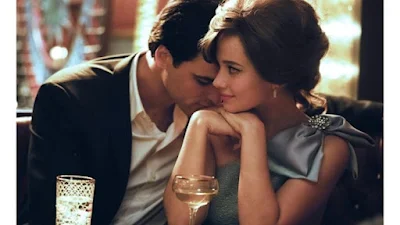Sofia Coppola is an auteur filmmaker whose thematic focus revolves around captivity and isolation, a recurring motif in her body of work. The characters in her films often find themselves confined, albeit in gilded cages. In the case of "Priscilla," the quest for liberation within the confines of a metaphorical cage revolves around none other than Elvis Presley.
The iconic meeting between The King and Priscilla Beaulieu occurred in 1959 during Elvis's stint in the U.S. Army stationed in Germany. Priscilla, the daughter of another officer stationed there, was a mere 14 years old at the time of their introduction. Coppola's film, crafted by the director and inspired by Priscilla Presley's 1985 memoir "Elvis and Me," pays homage to the author by presenting the narrative from her perspective. Despite contemporary criticisms of Presley's courtship, often described as unsettling or even characterized with terms like "groomer" (an apt descriptor seen in specific contexts here), the film portrays the attention of the shy superstar through the dreamy lens of a distracted Austin, Texas girl, offering a perspective where the interaction with the music legend is undeniably exhilarating.
In a clearly close collaboration with cinematographer Philipe Le Sourd (known for his work on Coppola's "The Beguiled") and editor Sarah Flack (a collaborator with Coppola since "Lost in Translation," and it's worth noting that Sarah is a personal friend), Coppola immerses the audience in a visually stunning world of serene and unexpectedly tranquil surfaces. In Priscilla's modest house in Germany, she engrosses herself in fan magazines, and later, at Graceland, following the directive to avoid excessive lawn appearances, she lounges in living rooms and dens that take on a notably gaudier aesthetic after her divorce from Presley in early 1973. Priscilla often grapples with a sense of purposelessness. As her famous husband's film career undergoes mismanagement, orchestrated by the never-seen Colonel Tom Parker (prompting one to wonder if Coppola, having seen Hanks in "Elvis," thought, "There's no surpassing Tom Hanks; I shouldn't even attempt it." However, it's unlikely that this was the case), he departs from Memphis to Los Angeles, leaving Priscilla with the charge to "keep the home fires burning."
The film raises the question of Priscilla's role in this dynamic. Despite orchestrating her separation from her family and essentially serving as a guardian, Presley adamantly refuses to engage in an intimate relationship with her, despite her growing desires for closeness. Their initial meeting in Germany unfolds with Presley, sincere and earnest, expressing his loneliness and the need for a girl to talk to, especially after the recent passing of his mother. At this point, the interactions seem innocent and genuine.
In the initial stages of their relationship, both Elvis and Priscilla are characterized by their innocence. Elvis, with a poster of "On The Waterfront" in his bedroom, expresses his desire to study at the Actor's Studio upon returning to the U.S., aiming to emulate Marlon Brando and James Dean. He takes Priscilla to see "Beat the Devil," and her amusement and awe stem from his ability to recite all of Bogart's lines from the movie. While he dreams of an expansive artistic life, she simply dreams of being with him. However, only one of them will see their dreams fulfilled, and even then, the dream might not be enough.
Caillee Spaeney delivers a spectacularly nuanced performance, portraying a 14-year-old with such authenticity that viewers might momentarily doubt her ability to believably age into a woman nearing 30. Yet, she accomplishes this transition beautifully. Jacob Elordi, in the role of Elvis, towers over her, creating an intentional exaggeration from real life that proves effective. This depiction of Elvis is soft-spoken, marked by disconcerting bursts of anger as he increasingly relies on medications for energy and sleep, foreshadowing the factors that ultimately led to his demise. While ostensibly more manageable, Coppola's storytelling conveys the insidious creep of these issues. The film delves into some of Presley's early '60s idiosyncrasies, including a phase of Bible study, reading the Autobiography of a Yogi, and even experimenting with LSD with Priscilla. Coppola's depiction of their psychedelic trip is one of the more credible accounts of such experiences in recent film. Despite rumored or real affairs during movie sets, he maintains Priscilla's chastity until marriage, after which she becomes pregnant immediately.
While Priscilla's unfulfilled desire is emphasized in the first 90 minutes, the movie chooses to skip the consummation of the wedding. Contrary to the trend of avoiding sex scenes that don't explicitly advance the plot, this omission seems intentional. Despite the extensive set-up and aftermath, the absence of this particular scene leaves room for interpretation. It's unclear if Sofia Coppola's choice is driven by ambiguity, withholding, or a measure of discretion, possibly influenced by Priscilla Presley's role as an executive producer and supporter of the film.
As the movie concludes, it becomes evident that Elvis is a captive himself, ensnared by his own fame and more. In a scene shot from behind during one of his numerous Vegas shows, it's apparent that he's trapped in a situation that Priscilla, whom he confined out of what he genuinely believed was love and fulfilling a real need, cannot alleviate. The tragedy that befalls Elvis becomes the liberation for Priscilla. Thus, Coppola's film concludes with a blend of poignant and haunting notes.
Note: This review was written during the Venice Film Festival, and "Priscilla" is scheduled to open on October 27, 2023.
Tags:
Romance Movie

